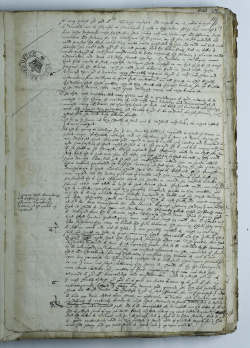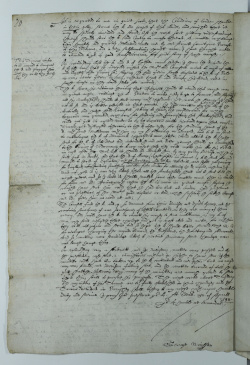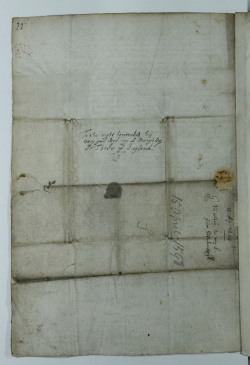Anti-Scots Play
N.B. The title used here is taken from Wiggins.
Historical Records
Correspondence
Correspondence of George Nicolson
15 April 1598. To William Cecil, Lord Burghley.

|

|

|
National Archives, SP 52/62/19, reproduced by permission.
- It is regrated [i.e. regretted] to me in quiet sorte, that the Comediens of London shoulde in their play, scorne the king and people of this lande, and wished that it may be spedely amended and staied; lest the worst sort gitting vnderstandinge thereof should stir the king and Contry to anger thereat. A matter wch beinge thus honestly and quietly deliuered vnto me by mr Arnett sometyme Prouost of this Towne and a very substantious honest man, I haue thought mete to commend to yor Lordshipes good consideracions, for present stay of suche courses.
- (National Archives, SP 52/62/19, fol. 19v; cf. Mackie 188)
Nicolson was an English agent in Edinburgh, effectively serving as an ambassador (Mackie xxi-xxii). The "mr Arnett" referred to in the letter was John Arnot, who had served as Lord Provost of Edinburgh from 1587 to 1592 (Roberts 86n17).
Theatrical Provenance
Acted in 1598 by a London company of players.
Probable Genre(s)
Unknown.
Possible Narrative and Dramatic Sources or Analogues
Unknown. (See Critical Commentary below.)
References to the Play
Possible Reference
The play may have been alluded to in the following year during a tense exchange between King James and the Kirk over travelling English players. In November 1599, Scottish ministers in Edinburgh prohibited their congregations from attending plays performed by the troupe of Lawrence Fletcher and Martin Slater, an order that was soon reversed in a proclamation by James, who had already granted a royal warrant to the company. Meeting with the King, the ministers failed to convince James of the legitimacy of their actions based on prior acts of parliament; as they departed, Robert Bruce said:
- "Sir, please you, nixt the regard we ow to God, we had a reverent respect to your Majestie's royall person, and person of your queene; for we heard that the comedians, in their playes, checked your royall person with secreit and indirect taunts and checkes; and there is not a man of honour in England would give suche fellowes so muche as their countenance." (Calderwood 5:766)
Mill implies that Bruce might have been alluding to the earlier performance in 1598 (301n3).
Critical Commentary
Chambers cited the play as an example of actors' "fairly free hand even with contemporary events" (1:322; the play is cited at 323n2).
Mill implies that this play may have been alluded to in 1599 (301n3). (See "References to the Play" above.)
Shapiro cites the anti-Scots play in his discussion of "Robert II, King of Scots" (1599); both plays, he argues, would have unpleasant reflections on the impending Stuart succession (430, 446).
Melchiori argues that "it is more than likely that the 'play' in question was Edward III [S.R. 1595; printed 1596], where the second scene offers a bitterly satirical presentation of King David of Scotland and Sir William Douglas […], while in the last scene of the play King David is led prisoner on the stage" (Garter, 117-18). He also suggested that the "play was presumably forbidden, and the 1599 reprint can be taken as an attempt by the publisher to get some profit from a play that was no longer to be seen on the stage," while the restriction would have been even more severe after the succession of James to the English throne, thus explaining Edward III's absence from the First Folio (118). (Cf. King Edward III, 12; Sams 150; Kirwan 155.)
Roberts states that the "original letter makes it clear (unlike the Calendar entry) that the offending play had been enacted in Edinburgh, not London," by a group of travelling players (85). Nicolson's solicitation of Burghley's intervention thus would have involved keeping the affair a secret from James "to prevent an embarrassing diplomatic incident from escalating into a crisis" (86).
Kerrigan compares the play with Edward III, Peele's Edward I, and Greene's George a Greene as contemporaneous plays with an anti-Scottish, even anti-Jacobean dimensions (14-15). Rather than identify the present play with any of the above, he proposes that the narrative sources of Admiral's "Vortigern" and "Mulmutius Dunwallow" would have "had scope for anti-Scottish satire" (420n67).
Wiggins (#1111) offered as another possible identification the Comedy of the King of England's Son and the King of Scotland's Daughter (published 1620 in a German translation as Comoedia von eines Königes Sohne aus Engellande und des Königes Tochter aus Schottlande), a play "in which the King of Scotland is cast as the comic parent unsympathetic to his daughter's love-life, and is shown consorting with a black magician and apparently poisoning the English Prince". There is a "remote possibility of identification" with the Admiral's Men's "Black Joan," but the absence of other contemporaneous possibilities in Henslowe's Diary might prefer the Chamberlain's Men as the more likely performers. In any event, it is unclear from Nicolson's description whether the play "directly represented a king of Scots (past or present), or whether, conversely, the perceived satire lay in an analogy or passing reference".
For What It's Worth
Sidney Lee transcribed the final words of the passage from Nicolson's letter as follows: "I haue thought mete to commend to your Lordships considerations [to] put stay of these courses" (8). Lee substitutes "[to]" for the MS's unambiguous "for," apparently in order to make grammatical sense of the sentence; however, this is only necessary if Nicolson's abbreviation for "present" is misread as "put."
Pace Roberts, I'm not sure that the original letter does in fact point unambiguously to a performance by travelling players in Edinburgh. Could not Arnot have heard of the performance from a third party, or from his own travels to London? If the players were scorning the Scottish people in Edinburgh, would not audiences have been quick to take offense and the affair likely been brought to the attention of Scottish authorities?
Works Cited
Site created and maintained by Misha Teramura, University of Toronto; updated 19 November 2015.